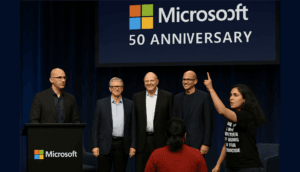Shocking Microsoft Protest: 2 Brave Employees Disrupt 50th Anniversary Over Israel AI Deal
Two Microsoft employees disrupted the company’s 50th anniversary celebration to protest its alleged involvement in Israel’s military operations. The protest took place at the Redmond, Washington headquarters, where top figures like Bill Gates, Steve Ballmer, and Satya Nadella were present. Ibtihal Aboussad, one of the employees, called out Microsoft AI chief Mustafa Suleyman, accusing the company of profiting from war and aiding in the loss of civilian lives in Gaza. Another employee, Vaniya Agrawal, also voiced concerns during a separate segment of the event.
The protest was sparked by recent investigations revealing Microsoft’s AI and cloud technologies have been used by the Israeli military to identify bombing targets. Reports from outlets such as +972 Magazine and the Associated Press link these tools to deadly airstrikes, including one that killed a Lebanese family. Employees demanded accountability for the company’s role in such operations. The disruption highlights growing internal resistance within the tech industry over ethical concerns surrounding the use of AI in warfare.

Shocking Microsoft Protest: 2 Brave Employees Disrupt 50th Anniversary Over Israel AI Deal
Microsoft’s milestone 50th-anniversary celebration at its Redmond, Washington headquarters took an unexpected turn when employees interrupted the event to protest the company’s alleged role in supporting Israeli military actions through its artificial intelligence (AI) technology. The gathering, held on April 4, featured high-profile attendees such as co-founder Bill Gates, former CEO Steve Ballmer, and current CEO Satya Nadella. However, the focus shifted when employees voiced their anger over Microsoft’s reported ties to Israel’s military operations in Gaza.
Protests Erupt During Key Moments
The first disruption occurred during a speech by Mustafa Suleyman, the head of Microsoft’s AI division. Employee Ibtihal Aboussad stood up, approached the stage, and shouted, “You are a war profiteer. Stop using AI for genocide!” She accused the company of enabling violence in Gaza, where thousands of civilians have been killed in recent conflicts. Suleyman responded briefly, stating, “Thank you for your protest, I hear you,” but Aboussad continued speaking until security escorted her out.
Later, another employee, Vaniya Agrawal, interrupted a panel discussion featuring Gates, Ballmer, and Nadella. While details of Agrawal’s remarks were not fully disclosed, the repeated protests highlighted internal tensions over Microsoft’s business decisions.
Accusations of Complicity in Military Operations
The demonstrations followed months of scrutiny over Microsoft’s partnerships with governments and militaries. Reports from investigative outlets like +972 Magazine and the Associated Press revealed that Microsoft’s cloud computing and AI services have become deeply integrated into Israel’s military infrastructure. According to these reports, the Israeli military’s reliance on Microsoft’s technology surged after the war in Gaza began in October 2023.
One particularly disturbing incident cited in the investigations involved Microsoft’s AI tools allegedly aiding in the selection of a bombing target in Lebanon in 2023. The strike reportedly killed a 63-year-old grandmother and her three young granddaughters. While Microsoft has not publicly confirmed or denied its role in this specific case, employees argue that the company’s technology is being weaponized, leading to civilian harm.
Growing Employee Activism in Tech
The protests reflect a broader trend of tech workers demanding accountability from their employers. Employees at companies like Google, Amazon, and Microsoft have increasingly spoken out against projects tied to military or government agencies involved in controversial conflicts. At Microsoft, workers have raised ethical concerns about the use of AI in warfare, arguing that such tools lack transparency and could escalate violence.
Satya Nadella, Microsoft’s CEO, has previously defended the company’s work with governments, stating that technology can “enhance global security.” However, critics, including protesting employees, argue that supplying AI for military use crosses a moral line—particularly in conflicts with high civilian casualties.
The Bigger Picture: AI’s Role in Modern Warfare
The controversy underscores urgent questions about the role of advanced technology in warfare. AI systems can process vast amounts of data to identify targets or optimize strategies, but their use in combat zones raises risks of errors, bias, and a lack of human oversight. Microsoft’s Azure cloud platform, for instance, is used to store and analyze military data, while its AI algorithms could potentially assist in decision-making processes during operations.
Protesters like Aboussad emphasize that Microsoft’s involvement isn’t just theoretical—it has real-world consequences. “We’re not talking about abstract technology,” she said in an interview after the event. “Our work is being used to take lives. How can we stay silent?”
Calls for Transparency and Change
The employees’ demands include greater transparency around Microsoft’s military contracts and a commitment to avoid projects that harm civilians. They’ve also urged the company to establish an independent ethics board to review high-risk partnerships. Similar calls have been made at other tech firms, though few companies have implemented binding policies.
Microsoft has yet to issue a detailed public response to the protests. However, the disruptions at its anniversary event signal that employee dissent is growing louder. As the tech industry continues to grapple with its role in global conflicts, the pressure on companies to balance profit, innovation, and ethics shows no signs of fading.
For now, the fallout from the protest serves as a reminder that even celebratory moments can’t shield corporations from scrutiny—especially when their technologies are entangled in human suffering.
You must be logged in to post a comment.